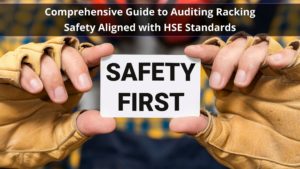
There are many people out there offering racking inspection services, but not everyone offers the same quality of service.
The aim of racking inspection services are to make your racking safer, so finding out that the person who provided those services was some kind of hack is a terrible outcome. At best, you’ll lose money. At worst, you’ll wind up with a warehouse which is less safe.
So how can you avoid being left in the lurch? Here’s our guide to six questions that you should ask a racking inspector before you get racking inspection services from them.
1. “What Racking Inspection Services Do You Offer?”
There are many different kinds of racking inspection services out there. Some companies offer regular inspections and some offer racking inspection training so that your staff can perform inspections themselves. What’s more, not all inspections are the same. Why is that? Well…
2. “Are You a SEMA Approved Racking Inspector?”
If this isn’t the second question you ask, then it should be the first. If your racking inspector isn’t a SEMA approved racking inspector, then the inspection they deliver won’t be to the SEMA standard of racking inspection.
This matters. HSE differentiates between regular racking inspections performed by your staff (or just some person) and an “expert” inspection. SEMA approved racking inspectors are labelled as “experts”, so if your inspection is from them, you’ll be following HSE’s advice. If your inspection isn’t from a SEMA approved racking inspector, then follow up with this question…
3. “What Makes You an “Expert” Racking Inspector?”
…Or, put another way, “what qualifies you to inspect my racking system?” HSE expects your racking system to be inspected by an “expert”. While it labels SEMA approved racking inspectors as “experts”, it doesn’t offer any other definition of this term.
In the past, this led to the rise of hundreds of card schemes, with anybody able to pull out a card and call themselves an “expert”. In 2015, this was all cleared up with the HSE CDM regulations. This legislation did many things but, for racking inspectors, the most important thing it did was allow the “client” to define who is and who is not an “expert” and who is and who is not “competent”.
In other words, if you own a storage system, it is your responsibility to decide if someone is expert enough to inspect your system. If the worst should happen, such as an injury or worse, then you may be asked to explain your thinking. You may be asked how you came to the conclusion that the person who inspected your racking system was an expert.
If you answer that they were a SEMA approved racking inspector, then you have HSE on your side. If you have a different answer, then it will need to be a good one.
4. “Are You Qualified to Inspect Cantilever Racking?”
HSE’s guide to warehouse and safety doesn’t differentiate between being qualified to inspect pallet racking and being qualified to inspect cantilever racking. It simply says that SEMA runs SARI (SEMA Approved Racking Inspector) courses and that the people who pass those courses are experts.
SEMA, however, does differentiate between people qualified to inspect cantilever racking and people qualified to inspect pallet racking. So, in lieu of relevant input from HSE, it’s best to defer to SEMA’s advice on this particular issue.
According to its database, there are 103 SEMA approved racking inspectors in the world, with qualified inspectors based in Ireland, Spain, Poland, Finland, Singapore, the United Arab Emirates and China. However, of those 103 inspectors, only 34 are also qualified to inspect cantilever racking.
Storage Equipment Experts has one of those 34 inspectors. According to SEMA, that’s makes us one of the few UK based businesses qualified to inspect both cantilever and pallet racking. Whoever inspects your pallet racking, make sure that are qualified to do so.
5. “How Often Do I Need a Racking Inspection?”
HSE’s answer to this question is that you need an“expert” inspection at least once year and “regular” inspections from “competent” staff. We’ve already discussed what HSE means by “expert” and “competent”, but “regular” is another open-ended idea. HSE states that the regularity should be determined by the Person Responsible for Racking Safety (PRRS).
If someone tries to tell you that you need more than one “expert” inspection year, they are also not wrong. The sixth section of the Provision and Use of Work Equipment Regulations 1998 states that all work equipment should be inspected “after installation and before being put into service for the first time” and “after assembly at a new site or location”.
What’s more, work equipment should be inspected “at suitable intervals” and when “exceptional circumstances” mean that the equipment could be damaged.
According to the fifth section of the same legislation, storage systems count as “work equipment”. As such, under any of the circumstances mentioned in the sixth section, a racking inspection from a SEMA approved inspector. That’s why HSE says “at least” once a year and not “only” once a year.
6. “What Makes You Qualified to Inspect Racking in This Country?”
As previously mentioned, SEMA approved racking inspectors operate all over the world. However, different safety regulations in different countries recommend different things. In short, not every country recommends having a racking inspection from a SEMA approved inspector.
Storage Equipment Experts operates in Ireland, where HSA also recommends racking inspection services from a SEMA approved racking inspector. EU directive states that racking systems need to be inspected by an “expert” inspector at least once a year. This is the same wording HSE uses and this is likely why there are SEMA approved inspectors operating in Finland, Poland and Spain as well.
While this is the case in Ireland and the EU, the situation in your country might be different. Be sure to check.
If you don’t fancy asking an inspector all of that, just contact Storage Equipment Experts. Our racking inspection services include SEMA approved pallet racking inspections, SEMA approved cantilever racking inspections and racking inspection training.





